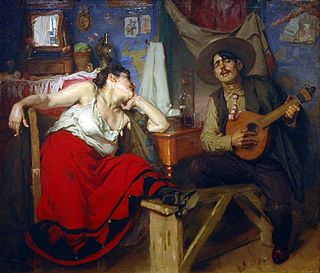Related Research Articles

Afonso de Albuquerque, 1st Duke of Goa, was a Portuguese general, admiral, and statesman. He served as viceroy of Portuguese India from 1509 to 1515, during which he expanded Portuguese influence across the Indian Ocean and built a reputation as a fierce and skilled military commander.
Psychedelic trance, psytrance, or psy is a subgenre of trance music characterized by arrangements of rhythms and layered melodies created by high tempo riffs. The genre offers variety in terms of mood, tempo, and style. Some examples include full on, darkpsy, forest, minimal (Zenonesque), hitech psy, progressive, suomi, psy-chill, psycore, psybient, psybreaks, or "adapted" tracks from other music genres. Goa trance preceded psytrance; when digital media became more commonly used psytrance evolved. Goa continues to develop alongside the other genres.

Electronic body music (EBM) is a genre of electronic music that combines elements of industrial music and synth-punk with elements of dance music. It developed in the early 1980s in Western Europe, as an outgrowth of both the punk and the industrial music cultures. It combines sequenced repetitive basslines, programmed dance music rhythms, and mostly undistorted vocals and command-like shouts with confrontational or provocative themes.
Surf music is a genre of rock music associated with surf culture, particularly as found in Southern California. It was especially popular from 1958 to 1964 in two major forms. The first is instrumental surf, distinguished by reverb-heavy electric guitars played to evoke the sound of crashing waves, largely pioneered by Dick Dale and the Del-Tones. The second is vocal surf, which took elements of the original surf sound and added vocal harmonies, a movement led by the Beach Boys.

Fado is a music genre which can be traced to the 1820s in Lisbon, Portugal, but probably has much earlier origins. Fado historian and scholar Rui Vieira Nery states that "the only reliable information on the history of fado was orally transmitted and goes back to the 1820s and 1830s at best. But even that information was frequently modified within the generational transmission process that made it reach us today."

Denis, called the Farmer King and the Poet King, was King of Portugal. The eldest son of Afonso III of Portugal by his second wife, Beatrice of Castile, and grandson of Afonso II of Portugal, Denis succeeded his father in 1279. He was married to Elizabeth of Aragon, who was later canonised as a saint of the Roman Catholic Church.
Krautrock is a broad genre of experimental rock that developed in West Germany in the late 1960s and early 1970s. It originated among artists who blended elements of psychedelic rock, avant-garde composition, and electronic music, among other eclectic sources. Common elements included hypnotic rhythms, extended improvisation, musique concrète techniques, and early synthesizers, while the music generally moved away from the rhythm & blues roots and song structure found in traditional Anglo-American rock music. Prominent groups associated with the krautrock label included Neu!, Can, Faust, Tangerine Dream, Kraftwerk, Cluster, Ash Ra Tempel, Popol Vuh, Amon Düül II and Harmonia.

Portuguese music includes many different styles and genres, as a result of its history. These can be broadly divided into classical music, traditional/folk music and popular music and all of them have produced internationally successful acts, with the country seeing a recent expansion in musical styles, especially in popular music.

The music of Angola has been shaped both by wider musical trends and by the political history of the country. while Angolan music has also influenced the music of the other Lusophone countries and Latin American countries. In turn, the music of Angola was instrumental in creating and reinforcing "angolanidade", the Angolan national identity. The capital and largest city of Angola — Luanda — is home to a diverse group of styles including kazukuta, semba, kizomba and kuduro. Just off the coast of Luanda is Ilha do Cabo, home to an accordion and harmonica-based style of music called rebita.

Soukous is a genre of dance music originating from the Democratic Republic of the Congo and the Republic of the Congo. It derived from Congolese rumba in the 1960s, with faster dance rhythms and bright, intricate guitar improvisation, and gained popularity in the 1980s in France. Although often used by journalists as a synonym for Congolese rumba, both the music and dance associated with soukous differ from more traditional rumba, especially in its higher tempo, song structures and longer dance sequences.

The mangue bit or manguebeat movement is a cultural movement created circa 1991 in the city of Recife in Northeast Brazil in reaction to the cultural and economic stagnation of the city. The movement largely focuses on music, but it has its own fashion and slang, and encompasses aspects of visual art. It mixes regional rhythms of Brazilian Northeast, such as maracatu, frevo, coco and forró, with rock, soul, raggamuffin, hip hop, funk and electronic music.
Latin rock is a term to describe a subgenre blending traditional sounds and elements of Latin American and Hispanic Caribbean folk with rock music. However, it is widely used in the English-language media to refer any kind of rock music featuring Spanish or Portuguese vocals. This has led to controversy about the scope of the terminology.
Samba rock is a Brazilian dance culture and music genre that fuses samba with rock, soul, and funk. It emerged from the dance parties of São Paulo's lower-class black communities after they had been exposed to rock and roll and African-American music in the late 1950s.

Dum Diversas is a papal bull issued on 18 June 1452 by Pope Nicholas V. It authorized King Afonso V of Portugal to fight, subjugate, and conquer “those rising against the Catholic faith and struggling to extinguish Christian Religion”— namely, the "Saracens (Muslims) and pagans" in a militarily disputed African territory. The document consigned warring enemies that lost to "perpetual servitude". This and the subsequent bull, issued by Nicholas in 1455, gave the Portuguese what they saw as moral justification to freely acquire slaves along the African coast by force or trade. The edicts are thus seen as having facilitated the Portuguese slave trade from West Africa and as having legitimized the European colonization of the African continent.
Lassan or more properly lassú ("slow") is the slow section of the csárdás, a Hungarian folk dance, or of most of Liszt's Hungarian Rhapsodies, which take their form from this dance. It generally either has a dark, somber tone or a formal, stately one.
Futurepop is an electronic music genre that has been characterized as a blend of synth-pop, EBM and dance beats, based on trance and techno.
Art pop is a loosely defined style of pop music influenced by art theories as well as ideas from other art mediums, such as fashion, fine art, cinema, and avant-garde literature. The genre draws on pop art's integration of high and low culture, and emphasizes signs, style, and gesture over personal expression. Art pop musicians may deviate from traditional pop audiences and rock music conventions, instead exploring postmodern approaches and ideas such as pop's status as commercial art, notions of artifice and the self, and questions of historical authenticity.
Experimental rock, also called avant-rock, is a subgenre of rock music that pushes the boundaries of common composition and performance technique or which experiments with the basic elements of the genre. Artists aim to liberate and innovate, with some of the genre's distinguishing characteristics being improvisational performances, avant-garde influences, odd instrumentation, opaque lyrics, unorthodox structures and rhythms, and an underlying rejection of commercial aspirations.

Brazilian science fiction has been a part of Brazilian literature since the mid 19th century. The first works of Brazilian Science Fiction emerged in the decades following Brazil's independence. Brazilian science fiction has its roots in authors such as Augusto Emílio Zaluar in the novel O Doutor Benignus and Machado de Assis in the short story O Imortal (1882). The genre grew in popularity over the 20th century, reaching its first “golden age” in the late 1950s, bolstered by the work of publisher Gumercindo Rocha Dorea. Following the end of the military dictatorship in 1985, the genre has witnessed a renaissance, with an influx of new writers and diverse influences reshaping the genre.
American eccentric cinema is a mode of contemporary American filmmaking that emerged in what has been termed the metamodern or new sincerity. Its attachment to indie cinema has led some to consider it a movement and genre of cinema in the United States. Its key filmmakers, including Wes Anderson, Charlie Kaufman, and Spike Jonze, are at times referred to as the "American Eccentrics". It occurred during the 1990s and 2000s, when indie directors sought to create films that diverted from the style and content of Hollywood franchise films. American eccentric cinema came in opposition to the mainstream ideas of formulaic narratives and the digitisation within films and new technologies that came about during the time period. American eccentric cinema is marked by films that are "deeply concerned with ethics and morality, the obligations of the individual, the effects of family breakdown, and social alienation."
References
- ↑ Wilson, Thomas M. (2023-11-30). Europe: An Encyclopedia of Culture and Society [2 volumes]. Bloomsbury Publishing USA. ISBN 979-8-216-17140-9.
- ↑ Horn, David (2017-10-05). Bloomsbury Encyclopedia of Popular Music of the World, Volume 11: Genres: Europe. Bloomsbury Publishing USA. ISBN 978-1-5013-2610-3.
- ↑ Robinson, Alex (2019-05-05). Alentejo. Bradt Travel Guides. ISBN 978-1-78477-627-5.
- ↑ Broughton, Simon; Ellingham, Mark; Trillo, Richard (1999). World Music: Africa, Europe and the Middle East. Rough Guides. p. 232. ISBN 978-1-85828-635-8.